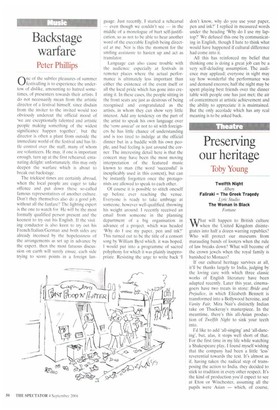Backstage warfare
Peter Phillips
One of the subtler pleasures of summer festivalling is to experience the undertow of dislike, amounting to hatred sometimes, of presenters towards their artists. I do not necessarily mean from the artistic director of a festival himself, since disdain from the inviter to the invited would too obviously undercut the official mood of 'we are exceptionally talented and artistic people making something of the widest significance happen together', but the director is often a plant from outside the immediate world of the festival and has little control over the staff, many of whom are volunteers. He may, if one is important enough, turn up at the first rehearsal, emanating delight: unfortunately, this may only deepen the warfare which is about to break out backstage.
The trickiest times are certainly abroad, when the local people are eager to take offence and put down these so-called famous representatives of another culture. Don't they themselves also do a good job, without all the fanfare? The lighting expert is the one to watch for He will be the most formally qualified person present and the keenest to try out his English. If the visit ing conductor is also keen to try out his French/Italian/German and both sides are already incensed by the hopelessness of the arrangements as set up in advance by the expert, then the most fatuous discussion on earth will surely ensue, each side trying to score points in a foreign Ian
guage. Just recently, I started a rehearsal — even though we couldn't see — in the middle of a monologue of hurt self-justification, so as not to be able to hear another word of the execrable English being directed at me. Nor is this the moment for the smiling ussistante to hasten up and act as translator.
Language can also cause trouble with the audience, especially at festivals in remoter places where the actual performance is ultimately less important than either the existence of the event itself or all the local pride which has gone into creating it. In these cases, the people sitting in the front seats are just as desirous of being recognised and congratulated as the artists, in whom they can show very little interest. Add any tendency on the part of the artist to speak his own language over the `verre amical' or not to sit with foreigners he has little chance of understanding and is too tired to indulge at the official dinner but in a huddle with his own people, and bad feeling is just around the corner. The interesting detail here is that the concert may have been the most moving interpretation of the featured music known to man (the word 'successful' is inexplicably used in this context), but can be instantly forgotten once the protagonists are allowed to speak to each other.
Of course it is possible to stitch oneself up before ever reaching the venue. Everyone is ready to take umbrage at someone, however well-qualified, throwing his weight around. I recently received an email from someone in the planning department of a big organisation in advance of a project, which was headed 'Why do I use my paper, pen and ink?' This turned out to be the title of a consort song by William Byrd which. it was hoped, 1 would put into a programme of sacred polyphony for which it was plainly inappropriate. Resisting the urge to write back 'I
don't know, why do you use your paper, pen and ink?' I replied in measured words under the heading 'Why do I use my laptop?' We defused this one by communicating in English, though I hate to think what would have happened if cultural difference had come into it.
All this has reinforced my belief that thinking one is doing a great job can be a very self-deluding assumption. The audience may applaud; everyone in sight may say how wonderful the performance was and demand encores; half the night may be spent playing best friends over the dinner table with people one has just met; the air of contentment at artistic achievement and the ability to appreciate it is maintained. But the only accolade which has any real meaning is to be asked back.


































































 Previous page
Previous page